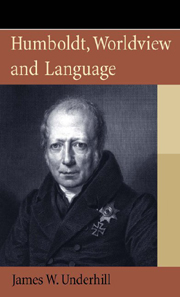Book contents
- Frontmatter
- Contents
- Acknowledgements
- Preface
- Part I Language and World
- Part II Humboldt, Man and Language
- 7 Worldview (Weltanschauung or Weltansicht)
- 8 Sprache
- 9 The Work of the Mind
- 10 Form
- 11 Creativity, Culture and Character
- 12 Catching the Character
- 13 A Seeing and Feeling Worldview
- 14 Four Dangers in the Comparative Approach
- 15 Reformulating the Worldview Hypothesis World
- 16 A Final Word
- Glossary
- Bibliography
- Index
7 - Worldview (Weltanschauung or Weltansicht)
from Part II - Humboldt, Man and Language
Published online by Cambridge University Press: 12 September 2012
- Frontmatter
- Contents
- Acknowledgements
- Preface
- Part I Language and World
- Part II Humboldt, Man and Language
- 7 Worldview (Weltanschauung or Weltansicht)
- 8 Sprache
- 9 The Work of the Mind
- 10 Form
- 11 Creativity, Culture and Character
- 12 Catching the Character
- 13 A Seeing and Feeling Worldview
- 14 Four Dangers in the Comparative Approach
- 15 Reformulating the Worldview Hypothesis World
- 16 A Final Word
- Glossary
- Bibliography
- Index
Summary
Who was Wilhelm von Humboldt, this thinker who contemplated languages and tried to draw some bold conclusions about their nature and the nature of speech itself? He was born Baron Karl Wilhelm von Humboldt in 1767 in Potsdam, Prussia. Jürgen Trabant, a present-day German Humboldt specialist, begins his Humboldt ou le sens de langage (Humboldt or the Sense of Language, published in 1992) by quoting the impression Humboldt made upon the French romantic poet, Chateaubriand. For the poet, Humboldt was a quiet man who would withdraw from society ‘to kill time by learning all the languages of the world and even their patois’ (Trabant 1992: 14, mT). For poets enamoured of the Byronic ideal, Humboldt did not seem to cut a very dashing figure. True, he was in Paris only ten years after the French revolution, a time of great social and philosophical turmoil; true he was the friend of two of the greatest German poets of the time, Schiller and Goethe. His career was hardly that of a failure: though Prussia was suffering from defeats in the Napoleonic wars, Humboldt himself played an important political role during the period as a Director for the Ministry of Culture (1809–1810) and as Ambassador (1810–1819), first in Vienna, then London, before returning to the same post in Vienna.
Still, that would hardly suffice to make him the pillar of philology that certain thinkers have considered him to be (Heidegger, Chomsky, Meschonnic, Trabant, Langham Brown, Hansen-Løve et al.).
Information
- Type
- Chapter
- Information
- Humboldt Worldview and Language , pp. 53 - 57Publisher: Edinburgh University PressPrint publication year: 2009
